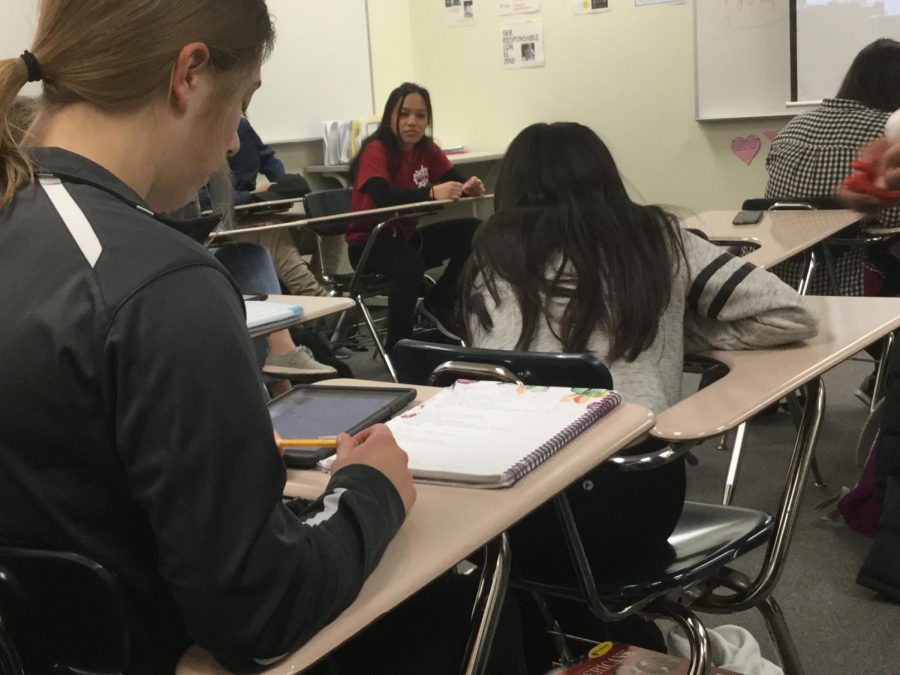Has homework become more of a burden than a benefit?
Students’ schedules are only made more hectic by homework that is occasionally more burdening than helpful.
March 22, 2018
Trends show that students across the United States are consistently up “burning the midnight oil” in order to finish assignments and tasks prescribed by their teachers on a daily basis.
While this is not only severely detrimental to their sleep schedules and biological clocks, it also raises the question: To what point is this homework actually beneficial to their learning?
High school students are often plagued with hours of seemingly pointless tasks that their teachers vaguely promise will somehow help them prepare for an upcoming test or just to enhance their learning.
It contradictorily, however, will not help them in learning the material the next day in class when they will struggle to hold their heavy eyelids open for each 48-minute period they have to endure.
Of course the fun doesn’t stop when the bell rings to dismiss 8th hour.
Most teenagers will go straight from class to practice, practice to dinner, and by the time they’re showered and finally ready to hit the hay, they get to lay down in bed and start a relaxing set of calculus problems, followed by an analysis on a Shakespearean tragedy, and probably a little bit of studying for their big U.S. History exam the next day too.
The cycle continues day after day, and by the time they get to Friday night, students are completely exhausted.
“As an athlete or anyone else involved in extracurriculars, you are going from one thing to another with no real break,” sophomore Chase Friel said. “By that Friday night I’m normally ready to just pass out. So much homework and so much time spent at practices just wears me out.”
The hardest part of this problem, as with most problems, is trying to find a solution.
Each element of the average American high schooler’s schedule seems so essential to their success that it seems almost impossible to make time for some much needed hours of rest.
And while the system is clearly broken, the question of what must give raises eyebrows.
In general, there as been a lot of heated debate throughout the nation about the quantity of homework students are receiving on a nightly basis, especially depending on the grade level they are in.
According to Time magazine, the recommended amount of homework students are assigned nightly should not exceed the number of minutes calculated by multiplying their grade level by ten.
For example, a second grader should receive no more than 20 minutes of homework per night, while an eighth grader should expect around an hour and 20 minutes.
“The National PTA and the National Education Association both support that guideline.”
That being said, teachers across the nation are doing quite the opposite of these guidelines, usually falling in one of the two extremes. One second grade teacher in Texas promised her students a “no formally assigned homework” policy during the 2016-2017 school year.
She instead sent students home with a notice that can be seen using the link above. In place of homework, she suggested that parents “[e]at dinner as a family, read together, play outside, and get your child to bed early” to improve student success.
Research by Duke University psychology professor, Harris Cooper, has indicated otherwise.
“There was generally consistent evidence for a positive influence of homework on achievement,” Cooper said in the abstract of his research article Does Homework Improve Academic Achievement? A Synthesis of Research, 1987–2003.
However, studies have also proven that this varies immensely by subject. Cooper notes in his commentary on the American Psychological Association’s website that “[t]hings like vocabulary and spelling are learned through practice. Other kinds of courses require more integration of material and drawing on different skills.”
“It annoys me when I get busy work from teachers because I know there are other things I should be spending my time on,” sophomore Sarah Juskiewicz says. “Homework is helpful in math for practicing and some English homework because it can be beneficial to future tests and skills, but classes with little projects due the next day are the worst.”
Juskiewicz elaborates that coloring and drawing pictures is not helpful for learning her Spanish vocabulary. She feels her time has been wasted by assignments like these, especially when the time she’s put in to the work has no equivalent output on test day.
Studies have proven that there are actually certain ways to make homework effective to the learning process, and certain ways that are equally if not more time consuming, but not nearly as helpful.
Methods including retrieval of information (quizzing oneself) and intentionally disorganized math worksheets are just two ways that students can make their homework as beneficial as possible.
It’s also important to evenly distribute how often one studies the same material. “Spacing” things like vocab words into a couple of minutes every night has proven to be a more effective learning method than cramming for hours once a week.
These recall/repetition, spacing, and “interleaving” methods are the ways that, according to NPR’s, Cory Turner, “[e]xperts agree that homework should generally be about reinforcing what students learned in class.” This means that homework is not the time for you to completely understand a new topic, it is merely supposed to reinforce the ideas you’ve already learned.
In fact, “[h]omework that cannot be done without help is not good homework,” the PTA says.
“As a parent it’s frustrating watching her spend hours on it, hours on geometry. Most people I think is math that they’re bringing home. Which I think, as a parent, is hard to do if you don’t understand how to do it an home. A math problem, you kind of need someone to help you,” mother of two PHS students Lisa Friel said.
As Friel explains, many students find themselves asking for assistance on homework on an almost nightly basis. When asked how often she seeks help, sophomore Christina Buckstaff responded with an all too familiar response.
“I think almost everyday,” Buckstaff said. “Sometimes the questions are simple but other times, especially in math, I’m completely lost and need an entire topic re-explained.”
However, it ultimately depends on the individual student. For some, getting homework may cause a great deal of anxiety, and for others, it can be difficult to learn without it.
And while it may be impossible to create a universal homework policy, the amount that students get and how much it weighs into their overall grade should be flexible enough to accommodate to all types of students.








